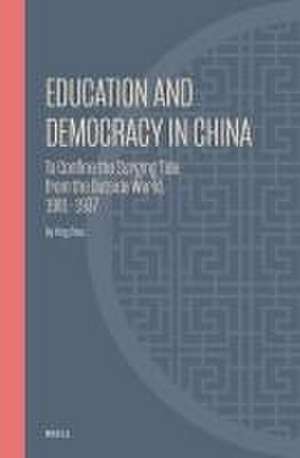Education and Democracy in China: To Confine the Surging Tide from the Outside World, 1901–1937: Ideas, History, and Modern China, cartea 31
Autor Zhou Yingen Limba Engleză Hardback – 12 dec 2023
Through a multi-level analysis of the (re)arrangements of national education and teachings of citizenship, Zhou unravels the complex political and educational nexus in China between 1901–1937, where the hope of education was to bring both political modernity and social progress.
Din seria Ideas, History, and Modern China
- 18%
 Preț: 793.41 lei
Preț: 793.41 lei - 18%
 Preț: 831.76 lei
Preț: 831.76 lei - 18%
 Preț: 554.75 lei
Preț: 554.75 lei - 18%
 Preț: 814.92 lei
Preț: 814.92 lei - 18%
 Preț: 820.27 lei
Preț: 820.27 lei - 18%
 Preț: 1238.62 lei
Preț: 1238.62 lei - 18%
 Preț: 1209.35 lei
Preț: 1209.35 lei - 18%
 Preț: 954.70 lei
Preț: 954.70 lei - 18%
 Preț: 1326.96 lei
Preț: 1326.96 lei - 18%
 Preț: 881.51 lei
Preț: 881.51 lei - 18%
 Preț: 605.33 lei
Preț: 605.33 lei - 18%
 Preț: 788.38 lei
Preț: 788.38 lei - 18%
 Preț: 669.22 lei
Preț: 669.22 lei - 18%
 Preț: 669.74 lei
Preț: 669.74 lei - 18%
 Preț: 666.98 lei
Preț: 666.98 lei - 18%
 Preț: 941.65 lei
Preț: 941.65 lei - 18%
 Preț: 612.73 lei
Preț: 612.73 lei - 18%
 Preț: 610.97 lei
Preț: 610.97 lei - 18%
 Preț: 687.15 lei
Preț: 687.15 lei - 18%
 Preț: 856.41 lei
Preț: 856.41 lei - 18%
 Preț: 837.01 lei
Preț: 837.01 lei - 18%
 Preț: 836.25 lei
Preț: 836.25 lei - 18%
 Preț: 685.90 lei
Preț: 685.90 lei
Preț: 558.48 lei
Preț vechi: 681.08 lei
-18% Nou
Puncte Express: 838
Preț estimativ în valută:
106.86€ • 111.89$ • 88.64£
106.86€ • 111.89$ • 88.64£
Carte indisponibilă temporar
Doresc să fiu notificat când acest titlu va fi disponibil:
Se trimite...
Preluare comenzi: 021 569.72.76
Specificații
ISBN-13: 9789004687875
ISBN-10: 9004687874
Pagini: 292
Dimensiuni: 155 x 235 mm
Greutate: 0 kg
Editura: Brill
Colecția Brill
Seria Ideas, History, and Modern China
ISBN-10: 9004687874
Pagini: 292
Dimensiuni: 155 x 235 mm
Greutate: 0 kg
Editura: Brill
Colecția Brill
Seria Ideas, History, and Modern China
Notă biografică
Ying Zhou, Ph.D. (2021), University of Groningen, is an assistant professor at Xiamen University. Her current research project is concerned with pragmatism and progressive education in China and Japan.
Cuprins
Acknowledgements
Note on Romanisation
List of Figures and Tables
List of Abbreviations
Introduction
1 Intertwining Themes of Education: Institutional Change and Enlightenment of the People
2 Aims and Objectives of the Book
3 Methodological Outline
4 Structure of the Book
1 A Seismic Shift in Education in the Last Decade of the Empire, 1901–1911
1 The Gestation of Fundamental Reform in Education
2 The 1904 Educational System: A Trade-off as well as a Breakthrough
3 The Constitutional Reform and its Implication for Education, 1905–1911
4 Conclusion
2 New Education and Republican Politics, 1912–1923
1 Educational Rearrangement and the Early Republican Politics, 1912–1916
2 Whose Victory? the “New System” and Disputes on Education for Democracy, 1916–1922
3 Actualising the Democratic Ideal: The 1923 Curricula
4 Conclusion
3 Education, Democracy, and Nationalism in the Republic, 1923–1937
1 Reflections on and Criticisms of New Education
2 Education in the Nanjing Decade
3 Education for Nationalist Democracy
4 Conclusion
4 Self-cultivation: Moral Education under Challenge, 1904–1923
1 Selection of Textbook Sources
2 Self-Cultivation as a School Subject
3 Self-Cultivation during 1904–1915: Teaching Morality, Democracy, and Citizenship
4 Self-cultivation during 1915–1923: Failing to Offer an Arena for Democratic Education
5 Conclusion
5 Citizenship: Education for Diverse Models of Democracy, 1923–1936
1 Selection of textbook sources
2 Citizenship as a School Subject
3 Education for Citizenship in an Era of Intellectual Pluralism, 1923–1927
4 Party education at the beginning of political tutelage, 1928–1932
5 Citizenship Education in the Transition to Constitutional Rule, 1932–1936
6 Conclusion
6 Conclusion: Education in a Society that Persistently Pursues Democracy
1 Education within a Context of Constant Changes
2 Educational and Socio-Political Reforms
3 Democratic Ideals and the Actualisation of Education for Democracy
Appendix
Bibliography
Index
Note on Romanisation
List of Figures and Tables
List of Abbreviations
Introduction
1 Intertwining Themes of Education: Institutional Change and Enlightenment of the People
2 Aims and Objectives of the Book
3 Methodological Outline
4 Structure of the Book
1 A Seismic Shift in Education in the Last Decade of the Empire, 1901–1911
1 The Gestation of Fundamental Reform in Education
2 The 1904 Educational System: A Trade-off as well as a Breakthrough
3 The Constitutional Reform and its Implication for Education, 1905–1911
4 Conclusion
2 New Education and Republican Politics, 1912–1923
1 Educational Rearrangement and the Early Republican Politics, 1912–1916
2 Whose Victory? the “New System” and Disputes on Education for Democracy, 1916–1922
3 Actualising the Democratic Ideal: The 1923 Curricula
4 Conclusion
3 Education, Democracy, and Nationalism in the Republic, 1923–1937
1 Reflections on and Criticisms of New Education
2 Education in the Nanjing Decade
3 Education for Nationalist Democracy
4 Conclusion
4 Self-cultivation: Moral Education under Challenge, 1904–1923
1 Selection of Textbook Sources
2 Self-Cultivation as a School Subject
3 Self-Cultivation during 1904–1915: Teaching Morality, Democracy, and Citizenship
4 Self-cultivation during 1915–1923: Failing to Offer an Arena for Democratic Education
5 Conclusion
5 Citizenship: Education for Diverse Models of Democracy, 1923–1936
1 Selection of textbook sources
2 Citizenship as a School Subject
3 Education for Citizenship in an Era of Intellectual Pluralism, 1923–1927
4 Party education at the beginning of political tutelage, 1928–1932
5 Citizenship Education in the Transition to Constitutional Rule, 1932–1936
6 Conclusion
6 Conclusion: Education in a Society that Persistently Pursues Democracy
1 Education within a Context of Constant Changes
2 Educational and Socio-Political Reforms
3 Democratic Ideals and the Actualisation of Education for Democracy
Appendix
Bibliography
Index
